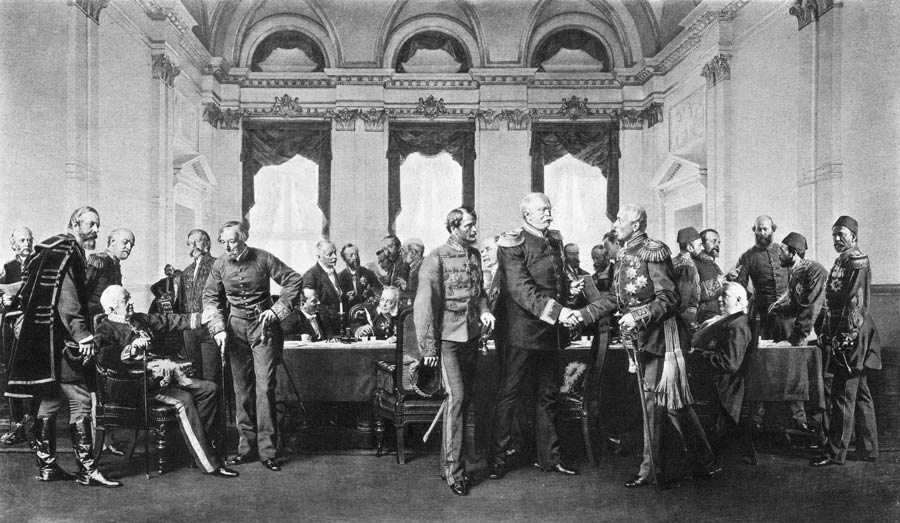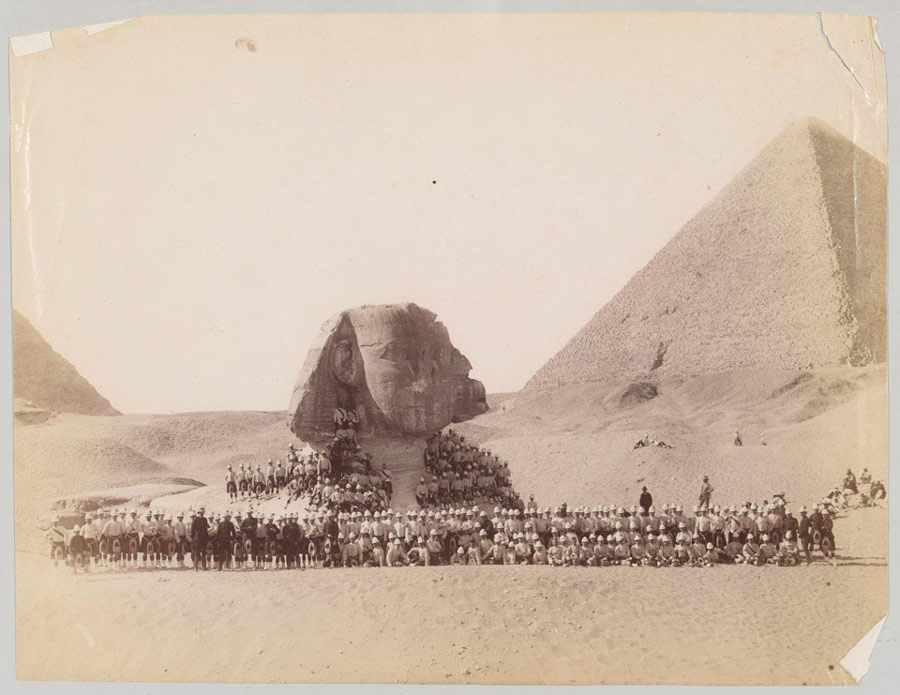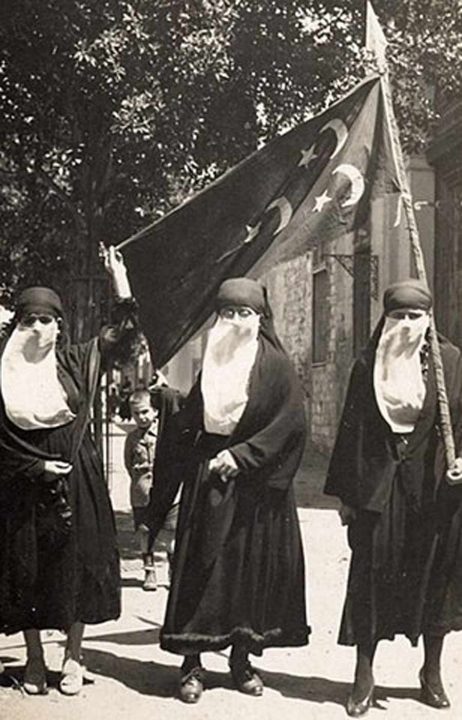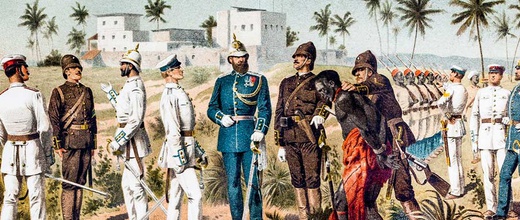The views expressed in our content reflect individual perspectives and do not represent the official views of the Baha'i Faith.
In this reflection on the Baha’i revelation we examine two different statements of Baha’u’llah – both of them clearly expressing a strong rejection of European colonialism and antisemitism:
At present the light of reconciliation is dimmed in most countries and its radiance extinguished while the fire of strife and disorder hath been kindled and is blazing fiercely. Two great powers who regard themselves as the founders and leaders of civilization and the framers of constitutions have risen up against the followers of the Faith associated with Him Who conversed with God. [Moses.] Be ye warned, O men of understanding. – Baha’u’llah’s 1882 Tablet of Maqsud
Verily that which was built in 1000 years or more is destroyed. Verily the deeds of Alexander who built Alexandria, and was thus named after him, have come to naught … This Wronged One is encompassed with another grief, and a new sorrow is added to his sorrows … Worst is the fact that the distinction between the oppressor and the oppressed hath become unknown. The essence of injustice [colonialism] claims to represent justice. A great country, for mere corrupt desires, hath been seized by the enemies … – Baha’u’llah’s September 20, 1882 Tablet to Zaynu’l-Muqarrabin, provisionally translated by the author.
Although these words were not revealed in the same tablet, we’ll explore both of them in this same reflection, because they share four significant characteristics:
- Their first common characteristic: both passages deal with actual social and political events happening in the world at the time. Baha’u’llah wrote in order to affirm his strong rejection of these events.
- The second common point is that both of them are written in the same year, 1882.
- Their third common feature: both of them contain strong criticism of oppressive aspects of European culture and politics.
- Their fourth commonality: both statements categorically reject violation of the human rights of any group by any other group.
Baha’u’llah’s first statement condemns the prevalent and systematic form of antisemitism in European countries and their discrimination against their Jewish citizens. His second statement strongly condemns the British colonial bombardment of the city of Alexandria and its invasion and occupation of Egypt. Interestingly, Baha’u’llah in these two statements did not mention the name of the invaded country – namely Egypt – nor did he mention the name of the colonial invader, namely the British state. Likewise, he does not name the two European countries that engaged in abhorrent anti-Semitic policies.

This likely means that Baha’u’llah, as the new prophet of God, was concerned in these passages with teaching humanity his fundamental spiritual principles, which require affirmation of the primacy of universal human rights, rather than focusing only on specific political events throughout the world. This approach indicates that his writings have a larger purpose – to completely reject the practices of colonialism and antisemitism, regardless of the identity of the oppressor or the oppressed.
Baha’u’llah’s Critique of Antisemitism
Baha’u’llah criticized the antisemitism of “Two great powers who regard themselves as the founders and leaders of civilization and the framers of constitutions,” as grave examples of tyranny in the 19th century world. The way he articulates his words emphasizes the contradiction and hypocrisy of European modernity. Baha’u’llah points out that two countries which promote themselves as leaders of civilization, upholders of the rule of law, advocates of the equal rights of all people and constitutional forms of government, are systematically engaging in a culture of racism, religious bigotry, and coercive policies against minorities.
Finding traditional forms of discrimiznation and hatred against Jews in medieval Europe or 19th century Iran was not unexpected. But for nations that claim to be the defenders of the liberty and rights of all people, such a culture and policy is nothing but pure hypocrisy.
In fact, in his writings Baha’u’llah approved of many aspects of European culture and politics, but he also noted the immaturity, the double standards, and the limited extension of many such trends. Democracy is praiseworthy, he wrote – but it must include women as well as all people regardless of their class position, religion, ethnicity, place of birth, or racial background. From a Baha’i perspective, then, liberty is praiseworthy – but for all beings, and not just one privileged group of people.

Baha’u’llah’s criticism of the antisemitism of European governments is a discourse that simultaneously condemns two very important forms of prejudice – antisemitism as both a racial prejudice and a religious prejudice. The motives for such hatred have often been mixed. The words of Baha’u’llah, therefore, condemn every kind of racism and religious oppression wherever it is found in the world.
Baha’u’llah’s Critique of Colonialism
The second statement of Baha’u’llah, written on September 20, 1882, discusses the bombardment and destruction of the ancient Egyptian city of Alexandria:
Verily that which was built in 1000 years or more is destroyed. Verily the deeds of Alexander who built Alexandria, and was thus named after him, have come to naught. – Ibid.
The rest of the tablet condemns the invader and laments the occupation of a great country, meaning Egypt, by the enemy, namely the British colonialists. The date of the tablet is crucial – in reaction to the Urabi revolt in Egypt, the British navy bombarded the city of Alexandria in July of 1882, and defeated Urabi’s army on September 13, 1892. This is the beginning date of the formal control of Egypt by the British army, which continued for sixty years until 1952. Baha’u’llah’s tablet, written one month after the bombardment, and exactly one week after the British occupation of Egypt, condemned such colonialism and lamented its effects. (Importantly, Baha’u’llah wrote several such tablets during those times, which have not been studied because they have yet to be published or translated.)

Baha’u’llah’s tablet rejects colonialism as such, and British colonialism in particular. Without specifically naming the British state, Baha’u’llah defined the invasion of Egypt in these terms:
The powerful ones show no compassion to the weak. For example, were one person [the British sovereign] to rule all over the earth, with only one village remaining outside of his dominion, he would conspire, day and night, to seize that village as well. Would that this enthusiasm and zeal would turn to other endeavors! – Ibid.
Baha’u’llah expressed his grief and sorrow over such a deadly event, and at the end of the tablet asked the Baha’is to pray for the victory of the Egyptians. Notably, Baha’u’llah himself and the Baha’is of the time were the targets of extreme forms of brutality and oppression by Muslims in Iran and even in the Ottoman empire – yet Baha’u’llah became encompassed with grief because the Muslims in Egypt were so wronged by a European colonial power. What was important for Baha’u’llah was the nobility and dignity of all human beings – which is why he defended, in that same year, both the Jewish and Muslim people who suffered persecution and injustice.
Spiritual Consciousness and its Negation of Colonialism and Racism
Baha’u’llah rejected the culture and politics of the violation of human rights as a matter of principle, without demonizing any particular group of people. His categorical condemnation of British colonialism in this tablet was not intended to demonize the British people or government, or glorify the Egyptians. Baha’u’llah regarded people and countries as characterized by contradictory attributes, acclaiming and encouraging whatever is praiseworthy and denouncing whatever is oppressive. His writings praise some aspects of European societies – their democratic freedom, religious tolerance, and their movement toward the abolition of slave traffic – while they also criticize and condemn their anti semitism, racism, materialism, militarism, and colonialism. Other parts of the world can learn from the positive aspects, he wrote, while they should abhor militarism and colonialism.

This condemnation of racism and colonialism logically arises out of Baha’u’llah’s spiritual worldview. Racism and colonialism ignore the spiritual reality of human beings and instead, reduce them to particular biological or other arbitrary social constructs like place of birth, gender, or the like. On the basis of this spiritual definition of identity, for Baha’is all humans represent sacred and beautiful reflections of divine attributes. Therefore, out of universal love for all human beings we must reject racism and colonialism, together with all other violations of human rights and nobility.
As just one example of the opposite reaction, some Muslim clerics denounce British colonialism, while defining the essence of justice as the future dominance of the Shi’i army led by the expected 12th Imam, who will kill all people, including Sunni Muslims, who refuse to become Shi’i Muslims. Those who hold such views are not opposed to colonialism itself – they are only opposed to being colonized by others, while dreaming of themselves colonizing and conquering other countries and other religious communities.
This kind of traditional religious fanaticism and materialistic modernity have one thing in common: both have forgotten the spiritual nature of human beings, and the nobility and beauty of all people. Baha’u’llah’s worldview represents a true rejection of all kinds of oppression because of his spiritual viewpoint. In the same tablet in which he condemns the British invasion of Egypt Baha’u’llah wrote that the:
… vast majority of wars in the world are waged out of mere corrupt desires, yet they are falsely attributed to religion, honor, and country. Religion and country bear witness to the falsehood of these people. Say! The world is but one country, and all are created by the same Word. Wherefore ye wage wars, and whom ye consider as enemy? – Ibid.

















Comments
Sign in or create an account
Continue with Facebookor